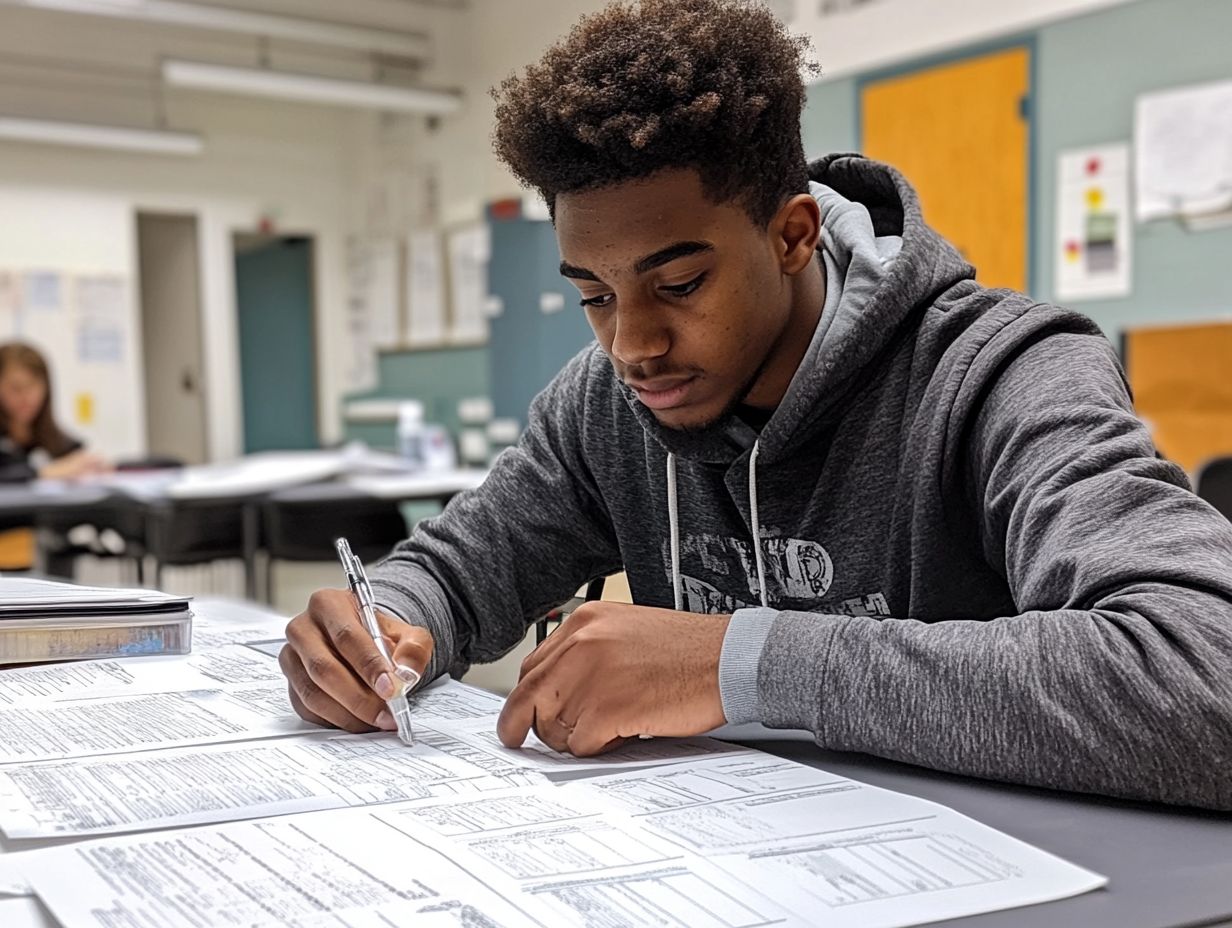how to evaluate my test preparation progress?
Preparing for a test can feel overwhelming, but understanding your progress can completely transform your experience!
This article delves into what test preparation progress entails and offers insights on how to effectively assess your current level. By identifying your strengths and weaknesses, you can implement effective study strategies that will elevate your preparation.
You’ll discover how to track your progress, the value of practice tests, and the critical importance of staying motivated throughout the process. We will also share helpful resources for when you need extra support.
Are you ready to maximize your study efforts? Let s dive in!
Contents
- Key Takeaways:
- Understanding Test Preparation Progress
- Assessing Your Current Level of Preparation
- Effective Study Strategies
- Tracking Progress and Making Adjustments
- Measuring Progress Through Practice Tests
- Staying Motivated During Test Preparation
- Seeking Help and Support
- Frequently Asked Questions
- How can I evaluate my test preparation progress?
- What is the best way to track my test preparation progress?
- Should I only focus on my strengths or also work on my weaknesses when evaluating my test preparation progress?
- How often should I evaluate my test preparation progress?
- What should I do if I feel like I am not making progress in my test preparation?
- Is it important to have a study group to check how I m doing in my test prep?
Key Takeaways:

Set clear goals and regularly assess your strengths and weaknesses to track your progress. Utilize effective study strategies, such as creating a study schedule and actively engaging with material. Stay motivated! Seek help, use available resources, and keep your eye on your ultimate goal!
Understanding Test Preparation Progress
Understanding your test preparation progress is essential for achieving academic success, particularly with standardized tests like the SAT.
Effective preparation includes a range of strategies. This involves developing good study habits and managing nervousness about exams, which is the feeling of worry or fear that can make it hard to perform well on tests.
Focus not just on mastering the material, but also on fostering a positive mindset and building your confidence.
Institutions like Carnegie Mellon University provide invaluable guidance as you navigate your journey toward mastering test-taking skills.
What is Test Preparation Progress?
Test preparation progress is your systematic approach to evaluating readiness for an upcoming exam. This involves creating a study guide and using study methods that work best for you.
Your journey typically begins with setting clear and attainable goals, whether that means aiming for a specific score on a standardized test like the SAT or ACT or mastering particular subject areas ahead of a final exam.
With these goals firmly in place, grasping the material becomes essential. You can tap into a variety of resources textbooks, online courses, and past examination papers to deepen your understanding and solidify your knowledge base.
Regular self-assessment is crucial for gauging your progress, allowing you to pinpoint areas that need more attention. Utilizing tools like quizzes and practice tests serves as valuable benchmarks, providing insight into your preparedness as the exam date draws nearer.
Assessing Your Current Level of Preparation
Evaluating your current test preparation level is essential for identifying your strengths and weaknesses and customizing your study strategies effectively. To enhance your approach, consider learning about the signs of effective test preparation.
This self-assessment reveals areas that need more attention and boosts your confidence with focused improvement.
By managing your time wisely, you can ease nervousness about exams and ensure a thorough understanding of the material, ultimately enhancing your chances of success on exam day.
Identifying Strengths and Weaknesses
Identifying your strengths and weaknesses in test preparation is crucial for developing effective coping mechanisms and stress relief strategies that can elevate your overall performance.
Engaging in self-reflection allows you to consider past experiences, helping you pinpoint areas of proficiency and aspects that need improvement.
Feedback from teachers or mentors can offer invaluable insights, shedding light on specific skills or knowledge gaps that might not be immediately apparent.
By analyzing your performance on practice tests, you can identify particular topics that challenge you, informing your study priorities.
Creating a personalized study plan based on these insights facilitates more focused preparation.
Setting realistic goals and allocating your time effectively empowers you to tackle weak spots while reinforcing your strengths, fostering a more balanced and effective approach to your studies.
Effective Study Strategies

Implementing effective study strategies is crucial for high school students as they navigate the intricacies of exam preparation.
Focus on cultivating strong study habits and ensuring you enjoy a nutritious breakfast on test day. Prioritize a restful night s sleep to enhance your cognitive function.
Creating a positive thinking environment greatly influences your confidence and overall performance in high-pressure assessment situations.
Tips for Improving Study Habits
Excited to boost your study habits? Start with practical strategies that make a real difference! Embrace techniques like mastering time management and using the brain dump method, which involves writing down everything you remember about a topic.
By prioritizing your tasks and crafting a structured study schedule, you can allocate the right amount of time for each subject. This ensures you cover every necessary topic without feeling overwhelmed.
Techniques like active recall, where you test yourself on the material instead of merely rereading it, can dramatically boost your retention.
Incorporating the brain dump method can further enhance your comprehension. It invites you to jot down everything you remember about a topic, helping you pinpoint any gaps in your knowledge.
Ultimately, by customizing these strategies to align with your unique learning preferences, you can foster a more efficient and enjoyable study experience.
Tracking Progress and Making Adjustments
Tracking your progress and making necessary adjustments are essential steps in your test preparation journey. These steps guide you towards success.
By utilizing practice tests and various evaluation tools, you can effectively monitor your understanding and retention of the material. This continuous assessment gives you the power to make timely adjustments to your study techniques, ensuring that you are optimally prepared as exam day draws near.
Tools for Monitoring Progress
Utilizing effective tools for monitoring your progress can provide you with personalized tips tailored to your unique study needs and learning style. This ensures you fully grasp the exam structure and test instructions.
Incorporate a mix of apps, planners, and online resources into your study routine to cultivate a customized academic experience. These tools empower you to set specific goals, track your milestones, and receive meaningful feedback, significantly enhancing your motivation and accountability.
Many of these resources feature practice tests and simulations that replicate actual exam environments. This allows you to familiarize yourself with the testing process. This holistic approach aids in mastering the content and builds your confidence as you prepare for those crucial assessments.
Measuring Progress Through Practice Tests
Measuring your progress through practice tests is an excellent strategy to assess your grasp of the material. To enhance your motivation during this process, consider exploring how to stay motivated during test prep, as it helps pinpoint areas that require improvement and bolsters your confidence in test-taking.
By regularly engaging with these practice exams, you familiarize yourself with the exam structure and fine-tune your time management skills. This transforms your study sessions into a more efficient and productive experience.
How to Use Practice Tests Effectively

Using practice tests effectively goes beyond simply taking them; it requires thoughtful analysis of your results. This analysis helps refine your test-taking strategies, encourage structured answers, and prioritize your mental health throughout the preparation process.
To truly unlock the benefits of practice tests, engage in a comprehensive review of each answer. Pay particular attention to the questions that challenged you. This reflective process enables you to spot patterns in your mistakes and create targeted strategies for improvement.
Incorporating timed simulations can be invaluable for managing test-related anxiety. It’s crucial for your well-being. By balancing your study sessions with regular breaks and self-care routines, you reinforce knowledge retention and foster your overall psychological health.
This approach paves the way for a more productive and less stressful preparation journey.
Take Action!
Start implementing these strategies today and watch your confidence soar!
Staying Motivated During Test Preparation
Maintaining motivation during test preparation is essential, particularly when confronted with setbacks or moments of self-doubt.
As a high school student, you can enhance your focus and drive by setting attainable goals, celebrating those small victories along the way, and reminding yourself of the power of a positive mindset.
This approach will not only help you navigate challenges but also pave the path to success in your exams.
Dealing with Setbacks and Maintaining Focus
Dealing with setbacks during your test preparation can be quite the challenge, but developing effective coping mechanisms and stress relief techniques can help you maintain focus and a positive attitude.
Embracing mindfulness practices, like meditation or deep-breathing exercises, can significantly enhance your ability to stay grounded and centered in stressful situations.
Cultivating a mindset of positive thinking allows you to view obstacles as opportunities for growth rather than insurmountable barriers.
Seeking support from friends, family, or study groups can offer encouragement and fresh perspectives that could prove invaluable.
Above all, cultivating resilience is essential. It gives you the power to bounce back from disappointments and stay committed to your study goals.
By integrating these strategies into your routine, you can navigate challenges more effectively and keep your sights firmly set on achieving your objectives.
Seeking Help and Support
Don’t underestimate the power of seeking help. It s crucial for your success during test preparation!
Tapping into resources like study guides, teacher assistance, and online platforms offers invaluable guidance that helps both your academic growth and mental well-being.
Using Resources and Seeking Guidance
Using available resources and seeking guidance are crucial steps for you to maximize your educational outcomes while effectively managing your mental health during test preparation.
Engaging with study guides, practice exams, and online forums allows you to deepen your understanding of essential concepts and access a wealth of information tailored specifically to your needs.
Don’t hesitate to reach out to your teachers for clarification on challenging topics; doing so can bridge knowledge gaps and provide you with personalized insights.
Collaborating with your peers in study groups creates a supportive environment where ideas flow freely and encouragement is abundant. This not only enriches your learning experience but also helps alleviate stress, fostering a more balanced approach to your academic challenges.
Frequently Asked Questions

How can I evaluate my test preparation progress?
There are several ways to evaluate your test preparation progress, such as taking practice tests, self-assessing your understanding of the material, and setting realistic goals for test preparation with feedback from a teacher or tutor.
What is the best way to track my test preparation progress?
The best way to track your test preparation progress is to create a study plan and set goals for each study session. This will help you stay organized and focused. You can track your progress by checking off completed tasks and reviewing your notes.
Should I only focus on my strengths or also work on my weaknesses when evaluating my test preparation progress?
It is important to focus on both your strengths and weaknesses when evaluating your test preparation progress. While it is important to build upon your strengths, it is also crucial to identify and work on your weaknesses in order to improve your overall performance.
How often should I evaluate my test preparation progress?
Make sure you evaluate your test preparation progress at least once a week to stay on track. However, if you have a major exam coming up, it may be beneficial to evaluate your progress more frequently, especially by learning how to set realistic goals for test preparation.
What should I do if I feel like I am not making progress in my test preparation?
If you feel like you are not making progress in your test preparation, it is important to take a step back and reassess your study methods. You may need to try a different approach or seek help from a teacher or tutor to identify any areas where you may be struggling. Additionally, learning how to stay motivated during test preparation can also help you regain focus and drive.
Start implementing these strategies today and watch your confidence soar!
Is it important to have a study group to check how I m doing in my test prep?
Having a study group can help, but it isn’t necessary. If you have one, dive into discussions and compare your progress with others!
This can highlight areas where you can improve and boost your confidence!
Don’t miss out on the chance to level up your study game!






